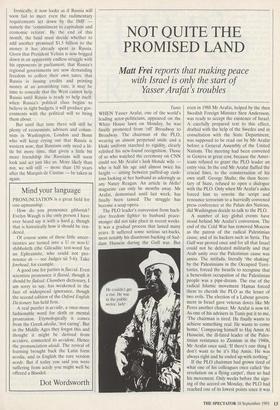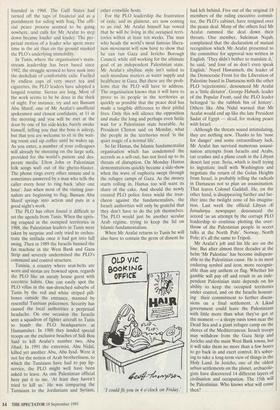NOT QUITE THE PROMISED LAND
Matt Frei reports that making peace
with Israel is only the start of Yasser Arafat's troubles
Tunis WHEN Yasser Arafat, one of the world's leading actor-politicians, appeared on the White House lawn on Monday, he was finally promoted from 'off Broadway to Broadway. The chairman of the PLO, wearing an almost perpetual smile and a khaki uniform starched to rigidity, clearly relished his new-found recognition. Those of us who watched the ceremony on CNN could see Mr Arafat's lush blonde wife who is half his age and almost twice his height — sitting between puffed-up cush- ions looking at her husband as adoringly as any Nancy Reagan. An article in Hello! magazine can only be months away. Mr Arafat, demonised until last week, has finally been tamed. The struggle has become a soap opera.
The PLO leader's conversion from bach- elor freedom fighter to husband peace- monger did not take place in recent weeks. It was a gradual process that lasted many years. It suffered some serious set-backs, most notably his disastrous backing of Sad- dam Hussein during the Gulf war. But even in 1988 Mr Arafat, helped by the then Swedish Foreign Minister Sten Andersson, was ready to accept the existence of Israel. A carefully prepared text to this effect, drafted with the help of the Swedes and in consultation with the State Department, was supposed to be read out by Mr Arafat before a General Assembly of the United Nations. The meeting had been convened in Geneva at great cost, because the Amer- icans refused to grant the PLO leader an entry visa. In the end Mr Arafat fluffed the crucial lines, to the consternation of his own staff. George Shultz, the then Secre- tary of State, refused to open a dialogue with the PLO. Only when Mr Arafat's aides forced him to rewrite the script and renounce terrorism to a hurriedly convened press conference at the Palais des Nations, did Washington decide to talk to the PLO.
A number of key global events have stood behind Mr Arafat's conversion. The end of the Cold War has removed Moscow as the patron of the radical Palestinian cause, and of its backers such as Syria. The Gulf war proved once and for all that Israel could not be defeated militarily and that Arab unity over the Palestinian cause was amiss. The intifada, literally 'the shaking' by the Palestinians in the Occupied Terri- tories, forced the Israelis to recognise that a benevolent occupation of the Palestinian people was a pipe-dream. The rise of the radical Islamic movement Hamas forced them to cherish the PLO as the lesser of two evils. The election of a Labour govern- ment in Israel gave veteran doves like Mr Peres another chance. Mr Arafat is now 64. As one of his advisers in Tunis put it to me, `The chairman is tired. He finally wants to achieve something real. He wants to come home.' Comparing himself to Haj Amin Al Husseini, the ill-fated leader of the Pales- tinian resistance to Zionism in the 1940s, Mr Arafat once said, 'If there's one thing I don't want to be it's Haj Amin. He was always right and he ended up with nothing.'
If the PLO chairman had grown tired of what one of his colleagues once called 'the revolution on a flying carpet', then so had his movement. Only weeks before the sign- ing of the accord on Monday, the PLO had reached one of its lowest points since it was founded in 1968. The Gulf States had turned off the taps of financial aid as a punishment for siding with Iraq. The offi- cial peace process seemed to be going nowhere, and calls for Mr Arafat to step down became louder and louder. The per- petual motion of a leader who spent more time in the air than on the ground masked the PLO's underlying immobility.
In Tunis, where the organisation's main- stream leadership has been based since 1982, the struggle seemed to have sunk into the deckchair of comfortable exile. Fuelled by endless cups of very sweet tea and cigarettes, the PLO leaders have adopted a languid routine. Siestas are long. Most of the work seems to be be done in the thick of night. For instance, try and see Bassam Abu Sharif, one of Mr Arafat's unofficial spokesmen and closest confidants, at 11 in the morning and you will be met at the door by one of his side-kicks, barely awake himself, telling you that the boss is asleep, but that you are welcome to sit in the wait- ing room and sip coffee until he wakes up. As you enter, a number of your colleagues will already be snoozing on the large sofa, provided for the world's patient and des- perate media. Elton John or Palestinian folk songs waft out of the ghetto-blaster. The phone rings every other minute and is sometimes answered by a man who tells the caller every hour to ring back 'after one hour'. Just when most of the visiting jour- nalists are beginning to flag, Bassam Abu Sharif springs into action and puts in a good night's work.
The PLO has often found it difficult to set the agenda from Tunis. When the upris- ing erupted in the occupied territories in 1988, the Palestinian leaders in Tunis were taken by surprise and only tried to orches- trate the intifada once it had got into full swing. Then in 1989 the Israelis banned the fax machine in the West Bank and Gaza Strip and severely undermined the PLO's command and control structure.
Tunisia, a country where seat-belts are worn and siestas are frowned upon, regards the PLO like an unruly house guest with eccentric habits. One can easily spot the PLO villas in the sun-drenched suburbs of Tunis by the red and white striped pill- boxes outside the entrance, manned by resentful Tunisian policemen. Security has caused the local authorities a perpetual headache. On one occasion the Israelis sent a squadron of fighter aircraft to Tunis to bomb the PLO headquarters at Hamamshet. In 1988 they landed special troops on the exclusive beaches of Sidi Bou Said to kill Arafat's number two, Abu. Jihad. In 1991 the extremist, Abu Nidal, killed yet another Abu, Abu Iyad. Were it not for the notion of Arab brotherliness, to which the Tunisians have had to pay lip- service, the PLO might well have been asked to leave. As one Palestinian official here put it to me, 'At least they haven't tried to kill us.' He was comparing the Tunisians to the Jordanians and Syrians,
other erstwhile hosts.
For the PLO leadership the frustration of exile, and its glamour, are now coming to an end. Mr Arafat himself has vowed that he will be living in the occupied terri- tories within at least ten weeks. The man who heads the world's most famous libera- tion movement will now have to show that he can run Gaza and Jericho Borough Council, while still working for the ultimate goal of an independent Palestinian state. Mr Arafat's sibylline style isn't suited to such mundane matters as water supply and healthcare in Gaza. But these are the prob- lems that the PLO will have to address. The organisation knows that it will have to prove to its people in the territories as quickly as possible that the peace deal has made a tangible difference to their pitiful lives. Only this will silence the opposition and make the long and perhaps even futile wait for a Palestinian state bearable. As President Clinton said on Monday, what the people in the territories need 'is the quiet magic of a normal life'.
So far Hamas, the Islamic fundamentalist organisation which has condemned the accords as a sell-out, has not lived up to its threats of disruption. On Monday Hamas demonstrations quickly became a side-show when the wave of euphoria swept through the refugee camps of Gaza. As the money starts rolling in, Hamas too will want its share of the cake. And should the newly created PLO police force wield the trun- cheon against the fundamentalists, the Israeli authorities will only be grateful that they don't have to do the job themselves. The PLO would just be another secular Arab regime, trying to keep the lid on Islamic fundamentalism.
When Mr Arafat returns to Tunis he will also have to contain the germ of dissent he
`I could fit you in 4 o'clock on Friday.'
had left behind. Five out of the original 18 members of the ruling executive commit- tee, the PLO's cabinet, have resigned over the peace deal. Many of the others feel Mr Arafat rammed the deal down their throats. One member, Suleiman Najab, complained that the declaration of mutual recognition which Mr Arafat presented to the committee for approval was written in English. 'They didn't bother to translate it,' he said, 'and four of us don't even speak English.' Nayef Hawatmeh, the leader of the Democratic Front for the Liberation of Palestine based in Damascus with the other PLO `rejectionists', denounced Mr Arafat as a 'little dictator'. George Habash, leader of the Popular Front, said the PLO leader belonged 'to the rubbish bin of history'. Others like Abu Nidal warned that Mr Arafat would end up like the late President Sadat of Egypt — dead, for making peace with Israel.
Although the threats sound intimidating, they are nothing new. Thanks to his 'nose for danger' and some extraordinary luck, Mr Arafat has survived numerous assassi- nation attempts from Israelis and Arabs, car crashes and a plane crash in the Libyan desert last year. Syria, which is itself trying to ingratiate itself with Washington and negotiate the return of the Golan Heights from Israel, is probably telling the radicals in Damascus not to plan an assassination. That leaves Colonel Gaddafi. He, on the other hand, is disappearing further and fur- ther into the twilight zone of his imagina- tion. Last week the official Libyan Al Jamahiriya newspaper denounced the accord 'as an attempt by the corrupt PLO leadership to continue plotting the over- throw of the Palestinian people in secret talks at the North Pole'. Norway, North Pole; it's all the same to Tripoli.
Mr Arafat's job and his life are on the line. But after almost three decades at the helm 'Mr Palestine' has become indispens- able to the Palestinian cause. He is its most enduring symbol and icon, more recognis- able than any anthem or flag. Whether his gamble will pay off and result in an inde- pendent Palestinian state depends on his ability to keep the occupied territories under control, and on the Israelis honour- ing their commitment to further discus- sions on a final settlement. A Likud government could leave the Palestinians with little more than what they've got at the moment — a sleepy oasis town near the Dead Sea and a giant refugee camp on the shores of the Mediterranean. Israeli troops may withdraw from the Gaza Strip and Jericho and the main West Bank towns, but it will take them no more than a few hours to go back in and exert control. It's sober- ing to take a long-term view of things in the Holy Land. In Jericho, one of the oldest urban settlements on the planet, archaeolo- gists have discovered 14 different layers of civilisation and occupation. The 15th will be Palestinian. Who knows what will come then?



































































 Previous page
Previous page